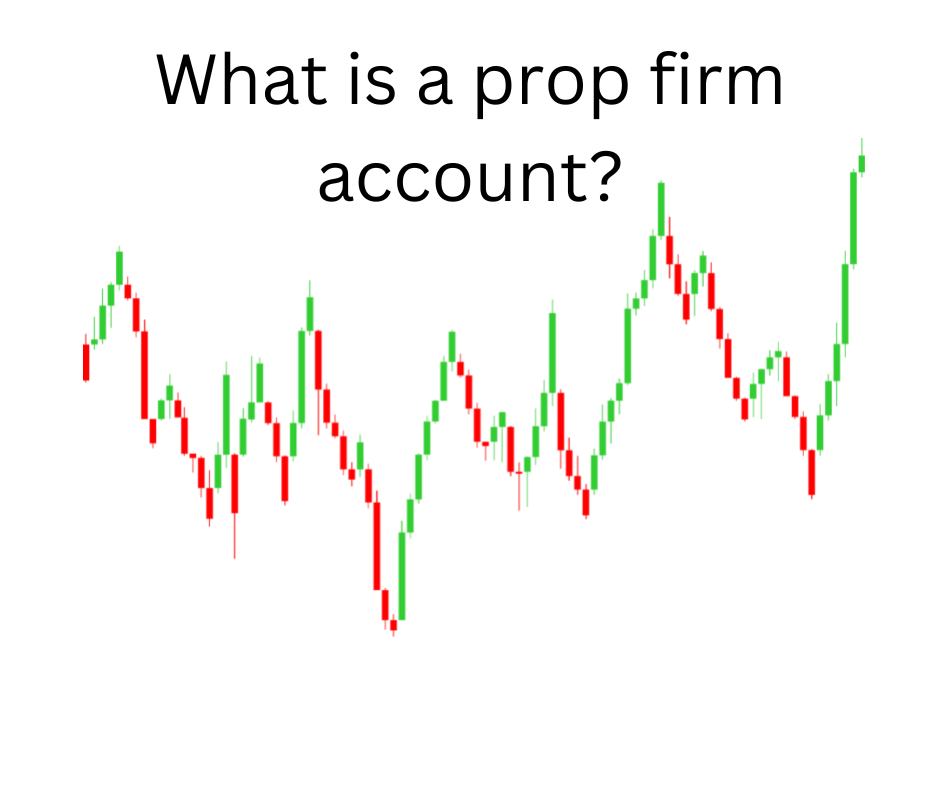When I first started my trading journey, I stumbled upon the concept of a Prop Firm Account. If you’re not familiar with this, let me share with you what I’ve learned.
Proprietary trading firms, or prop firms, are companies that trade financial markets with their own capital instead of clients’ money.
A Prop Firm Account is an account that a trader can use to trade the firm’s capital in return for a share of the profits.

Prop Trading Explained
Prop trading, in a nutshell, refers to the practice of trading with a firm’s own funds to generate profits for the company. This type of trading is different from traditional trading methods, where brokers execute trades on behalf of their clients. Prop traders aim to earn profits for the firm by taking on market risks; as a result, they share in the profits they generate.
Various strategies and techniques are used in prop trading, such as arbitrage, high-frequency trading (HFT), and statistical arbitrage.
Some prop firms may focus on specific financial instruments like stocks, commodities, or forex, while others may trade diverse instruments.
How Do Forex Prop Firms Work?
Forex prop firms specialize in trading the foreign exchange market, which is one of the world’s largest and most liquid markets. As a trader, you might be wondering how these firms operate. Here’s a brief overview of how they work:
Recruitment: Forex prop firms typically recruit traders through a selection process that may include interviews, trading tests, or even a combination of both. They look for traders with potential, regardless of their background or experience level.
Training: Once selected, new traders may undergo extensive training programs to develop their trading skills, learn the firm’s trading strategies, and understand risk management principles.
Funded Account: After completing the training, traders receive a funded account with the firm’s capital. They are then allowed to trade the forex market using these funds.
Profit Sharing: Traders share a percentage of the profits they generate with the prop firm. The profit-sharing ratio varies from firm to firm but usually ranges between 50% to 90%.
Prop Trading vs. Hedge Funds
You might be wondering about the differences between prop trading and hedge funds. While both involve trading financial markets, they have distinct differences in their objectives and operations.
Prop trading focuses on generating profits for the firm by using the company’s own capital. Prop traders are employees of the firm and are paid based on their trading performance. They typically trade a wide range of financial instruments and use various trading strategies to achieve their goals.
On the other hand, hedge funds are investment vehicles that pool capital from multiple investors to generate profits. Hedge fund managers trade on behalf of their clients, and their primary goal is to generate returns for their investors. They charge management fees and performance fees as their compensation.
Types of Proprietary Trading Firms
Proprietary trading firms come in different shapes and sizes. Here’s a quick breakdown of the different types of prop firms you may come across:
Traditional Prop Firms: These firms operate with a large capital base and focus on various asset classes, including stocks, bonds, commodities, and forex. They often have a team of traders specializing in different strategies and markets.
Remote Prop Firms: These firms allow traders to work remotely, allowing them to trade from anywhere. They usually offer their traders a structured recruitment process, training programs, and risk management guidelines.
Forex Prop Firms: As the name suggests, these firms specialize in trading the forex market. They provide traders with the necessary tools, resources, and capital to trade currency pairs, and often focus on specific trading strategies or styles, such as day trading or swing trading.
Algorithmic Prop Firms: These firms rely heavily on technology and utilize algorithmic trading strategies to trade financial markets. They often hire skilled programmers and quantitative analysts to develop, maintain, and optimize trading algorithms.
Retail Focused Prop Firms: These firms target retail traders who may not have sufficient capital to trade independently. They offer funded accounts and support services to help these traders succeed in the market.
Proprietary Trading Careers: Right for You?
If you’re considering a career in proprietary trading, it’s essential to understand the pros and cons. Here are a few factors to consider:
Pros:
Capital Access: Prop firms provide traders with the necessary capital to trade, allowing them to focus on their trading strategies without worrying about raising funds.
Training and Mentorship: Many prop firms offer comprehensive training programs and ongoing mentorship to help traders develop their skills and succeed in the market.
Flexible Working Conditions: Some prop firms offer remote trading opportunities, giving traders the flexibility to work from anywhere with an internet connection.
Cons:
Performance Pressure: Prop traders are expected to generate profits consistently, which can be stressful, especially during challenging market conditions.
Limited Control: Traders working for prop firms may be required to follow specific trading strategies or risk management guidelines, which can limit their freedom and creativity in the market.
Prop Trading Offers an Easy Entry to Trading for “Undercapitalized” Traders
One of the main attractions of prop trading is that it provides an opportunity for traders with limited capital to enter the market. Since prop firms provide the necessary funding, traders don’t need to worry about meeting minimum account balance requirements or facing margin calls.
Additionally, prop firms often provide access to advanced trading tools, technology, and platforms, enabling traders to execute trades efficiently and manage risk effectively. This support can be invaluable for undercapitalized traders looking to build their trading career.
Proprietary Firms Are Less Regulated Than Retail Brokers
An important aspect to consider when exploring prop trading is the regulatory environment. Proprietary trading firms are generally subject to fewer regulations compared to retail brokers. This is because prop firms trade their own capital and don’t handle client funds.
While this may provide some benefits in terms of flexibility and innovation, it also means that there may be fewer investor protections in place. As a trader, it’s essential to perform due diligence when choosing a prop firm and ensure that the company is reputable and operates with integrity.
What Are the Risks Involved with a Proprietary Firm?
As with any financial endeavor, there are risks associated with trading at a proprietary firm. Some of the key risks include:
Loss of Capital: Trading involves the risk of losing capital, and this risk is present even when trading a prop firm’s capital. If a trader consistently generates losses, they may lose their trading privileges or even face termination.
Limited Earnings Potential: Although prop traders can earn a significant portion of their profits, their earnings potential may be limited by the firm’s trading rules and risk management guidelines.
Reputational Risks: Working with a less reputable or poorly managed prop firm can expose traders to reputational risks, which can impact their future career opportunities.
How Much Money Do You Need To Be A Prop Trader?
Becoming a prop trader doesn’t necessarily require a significant upfront investment. Many prop firms have their own recruitment and training processes that don’t require an initial financial commitment from the trader. In some cases, a small fee may be required to access a funded account, but this amount is typically much lower than the capital needed to start an independent trading account.
It’s important to note that some prop firms may charge fees for their training programs or platform access. Before committing to a prop firm, be sure to research their fee structure and assess whether it aligns with your financial situation and goals.
Conclusion
Proprietary trading can be a rewarding and exciting career path for individuals who are passionate about financial markets and trading. By joining a prop firm, traders gain access to capital, resources, and training that can help them succeed in the market. However, it’s crucial to weigh the pros and cons of prop trading and understand the potential risks involved.
When choosing a prop firm, thorough research and due diligence are essential to ensure you’re partnering with a reputable company that aligns with your trading style and goals. By doing so, you’ll be better positioned to leverage the benefits of prop trading and build a successful career in the industry.
